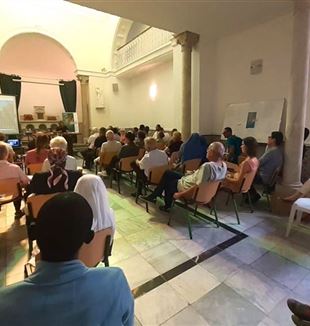
Tunis: Working on the mystery of one's life
The presentation of "The Religious Sense" in the North African capital. With Muslim Wael Farouq, an Egyptian professor, and Hatem Bourial, a Tunisian journalist, was Fr. Ambrogio Pisoni.Tunis. Saturday 7 October 2023, 10.30 a.m. The hall of the Bibliothèque Diocésaine in the heart of the Medina, the Old City of the Tunisian capital. The occasion: the presentation of Fr. Giussani's The Religious Sense available to the public present in the Italian, French and Arabic editions. Slowly the hall filled up.
In the front row was the Bishop, Monsignor Ilario Antoniazzi, accompanied by his vicar. A few priests and some religious women. Together with many lay people of all ages. Many young people. About fifteen Muslims. Sixty to seventy people in all. Bishop Ilario would later point out that the hall, which often hosts cultural events, had never been so crowded: more chairs had to be found in addition to those already set up.
At the origin of the event was the small and lively CL community in Tunis: five friends who crowd the Memores Domini house and who work, in various capacities, in the service of the diocese, and two chirpy Italian fathers who have been working there for some time. At 10.45 we began. Olivia introduced the event, which follows another, similar event on the occasion of the centenary of Fr. Giussani's birth celebrated in the Cathedral last February.
Our friend Professor Wael Farouq, Egyptian, Muslim, and lecturer in Arabic language and culture at the Catholic University of Milan, spoke first. He connected from Milan. With his usual fascinating sharpness, he recalled his meeting with a young Italian student in Cairo to study Arabic who had given him a copy of Fr. Giussani's text. That was the beginning of an unpredictable journey, full of ever new personal discoveries with cultural implications that are still pregnant with increasingly interesting openings, for example, the opportunity, as mentioned above, which led him to redefine the complex path of the history of Islam, especially in its dramatic relationship between tradition and modernity.
It was then the turn of Hatem Bourial, a Tunisian, Muslim, writer and journalist whom I had the opportunity to meet during the event last February. He read the book with great attention and growing interest. He described its path, identifying its relationship with the name of the movement founded by Fr. Giussani: for there to be a unity in the world made up of different people for an experience of liberation of self and reality. He went so far as to say: “We could say that it is the work of the Holy Spirit.”
The final word fell to me. I limited myself to highlighting the challenging nature of Fr. Giussani's provocation: addressed to every person, whoever they may be. The only condition is the desire to take one's own life seriously, one's own irreducible humanity – given and not sought –, the inexorability of the heart filled by the desire for its own infinite fulfilment.
Read also - Pizzaballa: "No to violence. Let us pray for peace"
Olivia’s conclusion put this challenge to those present, very positively struck by what they had heard: “Whoever wishes can begin a work together with our friends.” A work on the Mystery of one's own life: that 'strange' work whose beginning we know and whose outcome we cannot predict. As Hatem affirmed: the Holy Spirit plays its part here.